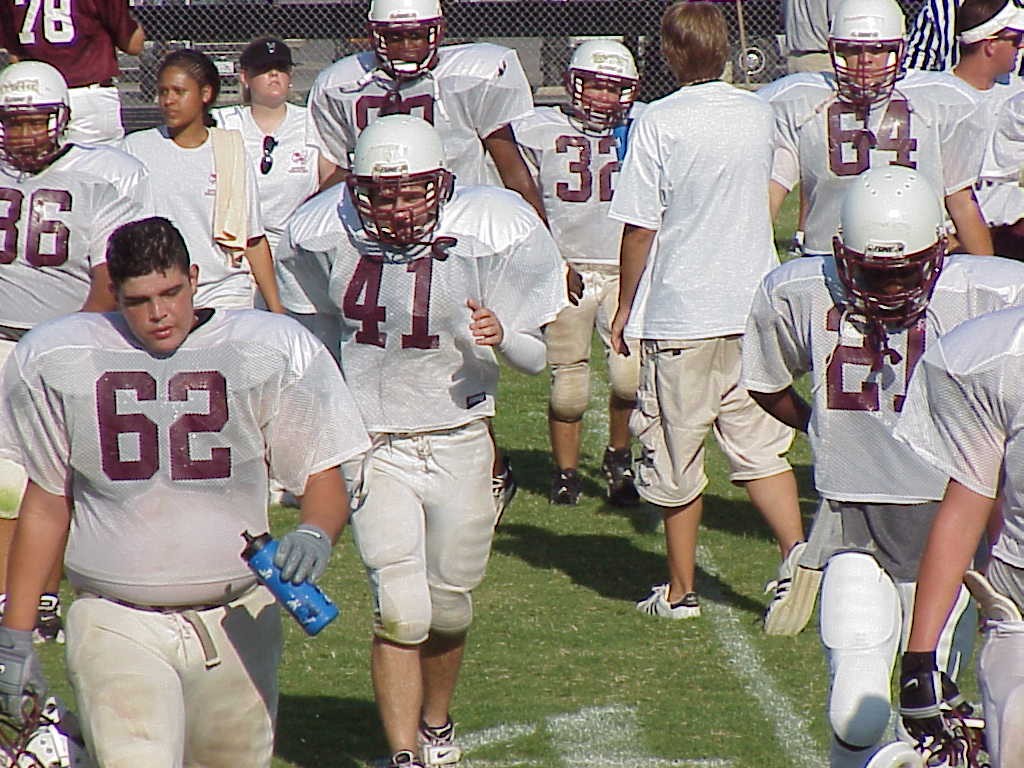Knowing when to quit and when to press on can be one of life’s toughest decisions. When things get tough, the tough get going… but do they go straight ahead or in a different direction? When I wanted to quit football in high school, my father taught me a lesson I have never forgotten.
 In preparation for the big homecoming game my sophomore year, our rural Oklahoma football team had ordered new uniforms so we would look our best during the halftime ceremony. Just one problem – there weren’t enough new uniforms for everyone. Junior and senior class players got first selections. Then as one of the coaches was giving sophomores their uniforms, he skipped me (and a couple of other “average” athletes) and gave the remaining uniforms to some of the talented freshmen players.
In preparation for the big homecoming game my sophomore year, our rural Oklahoma football team had ordered new uniforms so we would look our best during the halftime ceremony. Just one problem – there weren’t enough new uniforms for everyone. Junior and senior class players got first selections. Then as one of the coaches was giving sophomores their uniforms, he skipped me (and a couple of other “average” athletes) and gave the remaining uniforms to some of the talented freshmen players.
I was humiliated.
I wasn’t being a fashionista. This was a message to me that the coaches didn’t consider me a valuable contributor, and this message would be on public display to everyone else. The uniforms were so distinct the rest of the team would notice, as would everyone in the stands while we stood in the middle of the field during the homecoming ceremony. I couldn’t imagine being one of the few varsity players wearing a marred and tattered, older-style uniform. I walked up to the coach and said, “I quit.” and walked out of the field house.
Shortly after the game had started, my father wondered why I wasn’t on the field and he came and found me. I explained my reasons for quitting the team. He understood my frustration, but reminded me I had made a commitment to the coaches and my team. He encouraged me to finish out the season before deciding whether to quit, but left the decision up to me.
I knew he was right. After the game, I swallowed my pride and asked the coach if I could return to the team. I finished the season, but never played football after that year. Since I didn’t continue pursuing football, it may seem like rejoining the team was meaningless. But I learned some valuable lessons from my father’s advice.
All of us have been in a place like this – where we don’t feel like a valued contributor, where we don’t sense we are in our element or where we don’t feel fulfilled. Maybe that is where you are today. You have no desire to stay where you are, but quitting can be a scary proposition.
So, how do you decide when to quit? Here are a few tips.
-
Assess your commitments.
Did you commit to a timeframe or to specific deliverables? Consider how failing to meet those commitments could impact your employer, your client and/or your reputation. If staying committed is best for everyone involved, push to that finish line. I felt I had committed to completing the football season when I joined the team, so I pushed on. In another example, Heather Dorniden pushed herself to the literal finish line after falling during a 600 meter race. Here are the two inspiring videos: the first video and the second (hat tip to Michael Hyatt‘s great post “Don’t Quit Before the Whistle Blows).
If I miss a goal, which sometimes happens when you set huge ones, I want the reassurance that I did everything I in my power to make it happen. I want the peace in knowing that it wasn’t for lack of hustling that I missed a target for my dream. I want to know that the one thing under my control was under control.
Jon Acuff, Quitter: Closing the Gap Between Your Day Job and Your Dream Job -
Assess the opportunity to grow.
That event at homecoming helped me recognize I was only playing football because I thought I was supposed to. Honestly, I didn’t enjoy it and likely would never have been more than a mediocre player. The time I would have spent continuing to play football was instead funneled into creative activities I enjoyed and excelled in, as well as a part-time job.
Consider whether quitting now improves or limits your capacity to grow. What are the opportunity costs for sticking with it compared to trying something else? Do you have other options you know you can pursue and be excellent in doing?
Mediocre work is rarely because of a lack of talent and often because of the cul-de-sac. All coping does is waste your time and misdirect your energy. If the best you can do is cope, you’re better off quitting.
Seth Godin, The Dip -
Set a tripwire on your decision.
There are very few times when you commit to something for life, so most everything we commit to has to end eventually… but when? My father suggested I wait and decide whether to quit after the football season was over. This gave me a specific time to consider my decision. If now isn’t the right time for you to decide, set a tripwire. Do you need to make your decision after fulfilling your commitments, like I did? Maybe you need to prepare yourself for the transition. Practicality may require you to line up another option first. But don’t let these issues cause you to procrastinate. Estimate how long this should take and set a date for your decision. This will give you a specific goal to aim for and will help motivate you to make progress toward that goal.
Quitting isn’t easy, but languishing in mediocrity is no picnic either. By considering your options and making a plan, you can improve your opportunities for success. Finally, don’t feel like quitting makes you a loser. To quote Seth again from The Dip…
Winners quit all the time. They just quit the right stuff at the right time.
Seth Godin, The Dip
I hope these tips help you do exactly that. Quit the right stuff at the right time.
